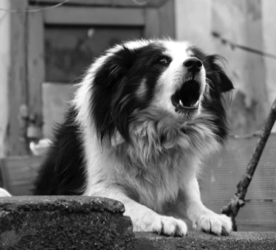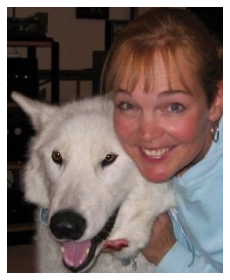Excessive Barking
Excessive barking is a common and frustrating problem. All you have to do is walk around any neighborhood, and you will hear dogs barking everywhere. Of course one of the reasons we have dogs is that they alert us when someone or something unfamiliar enters our property. That is a good thing. But we would like our dogs to only bark appropriately. This article is about how to achieve that.
There are two kinds of barking:
1. alarm barking
2. barking for attention and/or other rewards
Alarm Barking
Rover barks whenever he sees or hears something he finds threatening or unusual. In this case, Rover’s barking means “go away, stay away or else!” Rover’s barking also means “yo, mom/dad, what are we going to do about this potential threat!?”
Even though dogs have evolved from wolves a long time ago, and are quite different from them, they still have some things in common. Picture a wolf pack lounging around, and suppose a bear is wandering up to their territory. At that point it is the responsibility of the wolf who sees or hears the bear first to sound the alarm.
So when Rover barks when he hears something, in his mind he’s doing his job.
When the wolf parents hear the alarm, they will get up and survey the situation. They will then decide to do one of four things: attack, run away, bark to chase the bear off, or relax if the bear heeded the warning and is moving away. So when Rover barks, he wants a decision from you, his parent.
Here are some mistakes we make:
If you yell at Rover in an aggressive tone, Rover will just think that you are barking at the same thing he’s barking at, and will generally bark more. Rover doesn’t speak any English, and your yelling sounds like barking to him. Have you ever noticed that when one dog starts barking, all dogs around him start barking too. Well, now you’ve joined in the fray as well.
If you don’t do anything, you are confusing Rover as to whom the parental responsibilities belong to. Rover will think “hey, it’s a dirty job, but someone has got to do it. I guess they want me to decide what to do about this threat. I’ll just keep barking, and hopefully the threat will go away.”
Here are some solutions:
When Rover barks, go see what he is barking at, and then when you determine there is no threat, talk to Rover in a happy calm tone of voice. He won’t understand what you are saying, but he’ll respond to your tone. As soon as he stops barking, praise him. If there is someone at your door who scares you too, talk to Rover in a worried agitated tone. That will cause him to continue to alert. You are the parent, you make the decisions as to who is friend and who is foe.
If Rover barks all the time at everything, the best thing to do is to step up his socialization (please see the section on socialization for more information). For instance, sit with Rover at the window and give him a treat every time someone walks by, while talking to him in a happy calm voice. You only need to do this until Rover thinks that people walking by predict good things like treats, and that they are not a threat. It is a parent's responsibility to teach Rover what is safe and what is a threat. It is also very helpful to keep some white noise going in Rover's area to drown out outside noises. There are plenty of apps for that.
If Rover barks at other dogs and people when you are out walking with him, you can talk to him in a happy calm tone of voice and also keep your body posture and facial expression relaxed. If you get tense and/or yell at Rover, he will justly think “see, mom/dad freaks out every time a strange dog or person walks by; must be bad news.” Initially stay far enough away from what he is afraid of and then as Rover progresses, gradually get closer to it.
People and dog aggression problems are complicated issues that can put people and dogs at risk. They can also cause lawsuits. Therefore it is best to hire us or another positive trainer/behaviorist to help you if your dog has aggression issues.
Barking for Attention and/or Other Rewards
When Rover barks for attention or other goodies, any attention you give him, even telling him no or yelling, will reward the behavior and therefore increase the barking (see the article on training). So as soon as Rover barks at you, just turn around and walk away. If you ignore the barking, the barking will eventually stop as well, but it always increases first for a bit. This is called an extinction burst.
If Rover barks at his puppy brother or sister to get him/her to play with him, you can teach him a command like "go to your bed" with an implied "stay." This command is useful for tons of other situations as well. It's one of our favorites.
If Rover barks when you are away, first check out the article on separation anxiety. Sometimes Rover barks out of loneliness or boredom when you are away. In those cases it really helps to exercise Rover quite a bit before you leave, for instance by playing fetch. Leave Rover with activity toys like a stuffed Kong, bone, or Buster Cube to keep him busy. If you have multiple dogs, only leave those things out if you are certain they won't fight over them.
If all else fails, you could get a bark collar. Don’t ever get one that shocks Rover. Not only is it cruel, but it could teach him that his yard or house isn’t safe and cause separation anxiety. A bark collar that sprays citronella can be very effective. It just sprays citronella in front of Rover's face and he won't like the smell. Just don't let him sit on your lap when he is wearing it because you will get sprayed in the face if he barks. A citronella collar is also not appropriate in multi-dog households because the other dogs will get sprayed. A citronella collar shouldn't be used on shy dogs because in such individuals it can cause extreme fears. A bark collar that beeps generally is only effective for dogs that wind themselves up and just monotonously bark and howl. It interrupts their pattern.
We hope that the above tips will help you create a quiet home environment where your dogs only bark appropriately.
This article is a summary only of a treatment protocol for excessive barking.
For more information please call or text (303) 910-3931.
Disclaimer: Please note that the information herein is provided as a free service. It does not create any form of legal or professional relationship and Affection & Praise Family Dog Training, Inc. does not accept any liability or responsibility for any action taken or avoided on the basis of information provided. It is dangerous to rely on generalized information or guidance. You should always seek independent professional advice in order that it can be tailored to your own individual circumstances.


